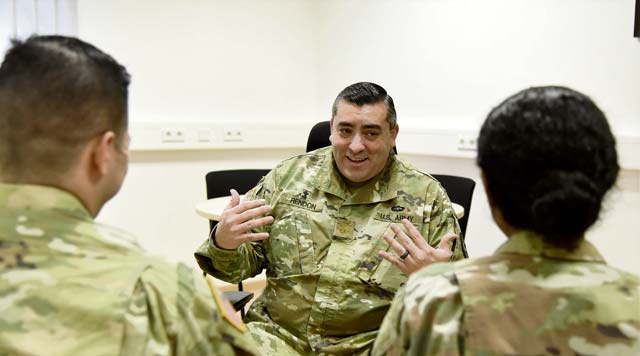
Life in a military community can be stressful enough, but when you add the pressures of deployments, relationships and children into the mix – healthy communication can suffer. Fortunately, U.S. Army Garrison Rheinland-Pfalz Chaplain Family Life Ministry brings counseling and training to those who need help.
The program provides master’s-level pastoral counseling to individuals, couples and families when appropriately referred by chaplains, Behavioral Health, Social Work Services or other helping agencies. Family Life Chaplains serve as subject matter experts on pastoral and clinical counseling issues.
“My number one primary role is providing long-term counseling and therapy to individual Soldiers, family members, children and DOD ID card holders,” explained Chaplain (Maj.) Mark Rendon, USAG RP Family Life chaplain. “Oftentimes, unit chaplains are able to provide immediate crisis counseling. If a unit chaplain knows a Soldier will need more time or experience, then a referral is made to me. Subsequently, I can pick up where they left off and provide the individual with long-term therapy. In some situations, unit chaplains and I collaborate and or co-counsel together.”
Family Life Chaplains also provide marriage and family counseling as a way to help Soldiers reconnect to build stronger, healthier bonds with their loved ones after deployments, exercises or in garrison. They create a safe, comfortable environment for people to discuss their issues to receive the help they need.
Rendon earned a bachelor’s of Bible and Theology from Christian Life College in 1997 and received a master’s of Divinity from Western Seminary in 2005. In 2016, he attended an 18-month Family Life Chaplain program at Fort Hood, Texas, which included earning a Master of Science Marriage and Family Therapy degree at Texas A&M University. He was later assigned to USAG RP to assist the Kaiserslautern Military Community with their counseling needs. Not only does he support the community, Rendon provides “outside-the-chain-of-command” pastoral counseling and psychotherapy for other chaplains, chaplain assistants and senior leaders.
During his training, he studied several therapy approaches and learned how to employ them based upon an individual’s needs. Some treatment methods include solution-focused pastoral counseling, cognitive behavioral therapy and eye movement desensitization reprocessing and emotion-focused therapy.
Rendon regularly uses emotion-focused therapy because, “we are emotional beings. I’ve discovered when it comes to couples, they struggle to connect on a deeper level than just having simple conversations. So therefore, the struggle becomes ‘How can I connect?’”
The chaplain of 20 years is also charged with providing education, consultation and pastoral counseling, while providing clients with resources to develop healthy relationships on every level to help them thrive under the pressures of military life. Consultation and pastoral counseling is a formal and spiritually integrated process, enabling clients to change, cope and resolve their issues in both a religious and non-religious framework.
Rendon said assisting people through ministry was something he was called to by God through faith.
“I always knew I would become a chaplain, but my conviction was to be enlisted first. So that’s what I did,” said the chaplain, who enlisted as a 19 Delta Cavalry Scout and a 19 Kilo M1A1 Abrams Tank Crewman for the first three years of his military career. He later served as a chaplain candidate in the Army Reserves, while working as an assistant pastor in the civilian sector until Rendon went back on active duty in 2005.
“Within my first week of becoming a military chaplain, I responded to a murder/suicide incident. If it wasn’t for my fellow 1st Brigade, 4th Infantry Division chaplains who worked beside me helping me along, I would have suffered immensely,” said the El Monte, California, native.
After that tough first week, Rendon began preparing for his first, yearlong Iraq deployment by attending a 30-day pre-deployment training assignment at the National Training Center in Fort Irwin, Calif. It was there that he met Private 1st Class Marcus Ellerbe who was discouraged and grappling with the idea of getting out of the Army.
“A few NCOs and I were talking to him and really trying to help him through his struggles. The result was we fueled his desire to eventually go ‘Green to Gold’ so he could become an officer and continue making a positive impact in the Army and on the lives of Soldiers,” he recalled.
Rendon kept in touch with First Lieutenant Ellerbe over the years and looks upon him as a walking testament of what constructive counseling and active listening can do for someone who is in need.
“I experienced so much within the first 60 days of being a military chaplain. As military chaplains, we are exposed to four to six times the amount of negative, intense events than civilian ministers experience,” Rendon said. “What I experienced in one year – dealing with really tough issues like suicide, domestic violence, homicidal thoughts, mental and spiritual issues – is what military chaplains deal with regularly.”
With training exercises, deployments and time spent away from loved ones, service members are often separated from their families. Rendon uses his experiences and training to help take care of those in need today.
“Pastoral identity and experiences are crucial. If I don’t know who I am, what I’m doing and why I’m here – I’m ineffective,” Rendon concluded.
For more information about the Chaplain Family Life Ministry Program or to schedule an appointment in Kaiserslautern, call DSN 541-2105, civilian at 0611-143-541-2105 or visit Bldg. 3213, Room 110, on Kleber Kaserne. In Baumholder, call DSN 531-3170 or civilian at 0611-143-531-3170 or visit Bldg. 8681, Room 102, on Smith Barracks, Baumholder. People can also call Rendon’s government-issued cell phone at 0162-270-7971.


